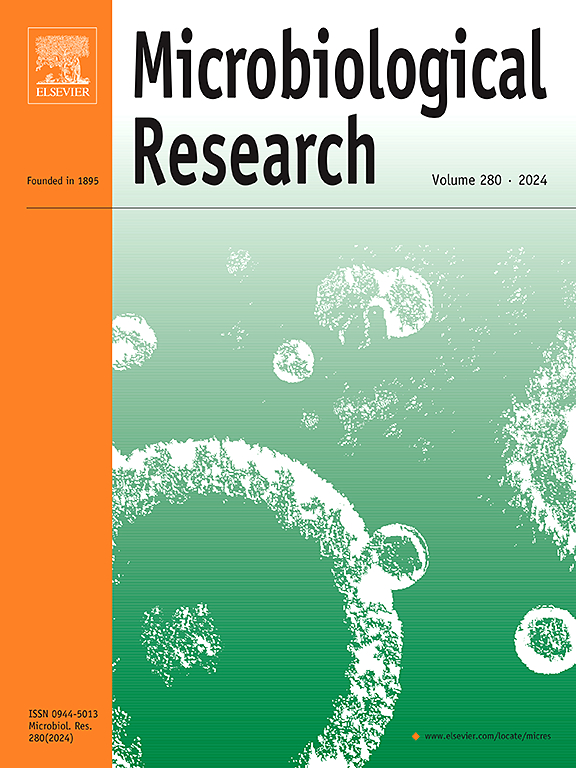Receptor-targeted Lactococcus lactis mitigate Clostridioides difficile infection
IF 6.9
1区 生物学
Q1 MICROBIOLOGY
引用次数: 0
Abstract
Engineered bacteria play an important role in colorectal disease. Lactococcus lactis (L. lactis) can inhibit Clostridioides difficile (C. difficile) by producing antimicrobial peptide nisin. However, its insufficient nisin production levels, lack of targeted in vivo release and weak colonization ability may limit its therapeutic efficacy against C. difficile infection (CDI). In this study, we engineered a strain of L. lactis with high adherence and therapeutic potential (Lla+) by expressing C. difficile adhesion protein Cwp8 on the surface of a L. lactis strain with high nisin yield (4019 to 4028 IU/ml). The adhesion effect of Lla+ was increased by 1.3-fold compared to the wild type L. lactis in the HT-29 cell model. We created the lipid membrane-coated L. lactis (LCL) by encapsulating Lla+ with the ROS-responsive lipid membrane. LCL exhibited targeted release of nisin payload in response to H2O2, lipopolysaccharide and C. difficile in vitro, as well as in various mouse models of intestinal inflammation in vivo. The therapeutic effect of LCL against CDI was substantial, reducing C. difficile survival by 60 % compared to the untreated control. In the treatment of recurrent CDI (rCDI), LCL outperformed the drug fidaxomicin, the first-line treatment for rCDI recommended by Infectious Diseases Society of America (IDSA), decreasing C. difficile survival by 48 % and lowering the levels of toxins TcdA and TcdB by 57.1 % and 65 %, respectively. These results suggested that the presented the encapsulation approach could serve as a delivery platform to target inflamed intestines and expand the application of probiotics as pharmaceuticals.
受体靶向乳酸乳球菌减轻艰难梭菌感染
工程细菌在结直肠疾病中起重要作用。乳酸乳球菌(Lactococcus lactis)可以通过产生抗菌肽nisin来抑制艰难梭菌(clostridiides difficile)。然而,其nisin生成水平不足,缺乏靶向体内释放和较弱的定殖能力可能会限制其对艰难梭菌感染(CDI)的治疗效果。在本研究中,我们通过在乳酸菌表面表达艰难梭菌粘附蛋白Cwp8,构建了一株具有高粘附性和治疗潜力的乳酸菌(Lla+),乳酸菌具有较高的nisin产量(4019 ~ 4028 IU/ml)。与野生型乳酸乳杆菌相比,Lla+ 在HT-29细胞模型中的粘附作用提高了1.3倍。我们用ros反应的脂质膜包裹Lla+ ,制备了脂质膜包被乳酸乳杆菌(LCL)。LCL对H2O2、脂多糖和艰难梭菌的体外反应以及体内多种肠道炎症小鼠模型均有针对性地释放nisin有效载荷。LCL对CDI的治疗效果显著,与未治疗的对照组相比,艰难梭菌的存活率降低了60% %。在治疗复发性CDI (rCDI)时,LCL优于美国传染病学会(IDSA)推荐的治疗rCDI的一线药物非达霉素(fidaxomicin),使艰难梭菌存活率降低48% %,毒素TcdA和TcdB水平分别降低57.1% %和65% %。这些结果表明,该方法可以作为靶向炎症肠道的给药平台,扩大益生菌作为药物的应用。
本文章由计算机程序翻译,如有差异,请以英文原文为准。
求助全文
约1分钟内获得全文
求助全文
来源期刊

Microbiological research
生物-微生物学
CiteScore
10.90
自引率
6.00%
发文量
249
审稿时长
29 days
期刊介绍:
Microbiological Research is devoted to publishing reports on prokaryotic and eukaryotic microorganisms such as yeasts, fungi, bacteria, archaea, and protozoa. Research on interactions between pathogenic microorganisms and their environment or hosts are also covered.
 求助内容:
求助内容: 应助结果提醒方式:
应助结果提醒方式:


